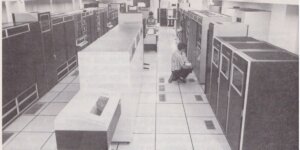
Cliff Neuman, center, and Winnie Callahan, to his left, receive certification
The National Security Agency and the Department of Homeland Security have designated the University of Southern California a National Center of Academic Excellence in Information Assurance Research (CAE-R).
“Cybersecurity is a priority area of research for USC, and one which will require participation across our entire university for us to become effectual on a global stage,” said Elizabeth Garrett, USC provost and senior vice president for academic affairs. “This recognition demonstrates our strong past and current achievements, and also establishes wonderful opportunities for the future.”
The goal of CAE-R programs is to reduce vulnerability in the U.S. national information infrastructure by promoting higher education and research in information assurance and producing a growing number of professionals with expertise in relevant disciplines.
Information assurance is generally defined as operations that protect and defend information and information systems by ensuring their availability, integrity, authentication, confidentiality and nonrepudiation.
USC offers information assurance-related courses at both the undergraduate and graduate levels through the USC Viterbi School of Engineering Department of Computer Science, the Information Sciences Institute (ISI), Ming Hsieh Department of Electrical Engineering and the Information Technology Program (ITP). The instructors include distinguished academicians, research faculty, and professional cybersecurity specialists.
Director of USC’s Center for Computer Systems Security (CCSS), B. Clifford Neuman, and ISI Director of Innovation Winnie Callahan were on hand to receive the honor at the 15th Annual Conference of the Colloquium for Information Systems Security Education at the National Museum of the United States Air Force in Fairborn, Ohio.
Neuman noted that the CCSS “provides a focal point at USC for research in all aspects of computer security” in topics ranging from privacy, provenance, trustworthiness, critical infrastructure protection and policy.
The CCSS works closely with cyber-DEfense Technology Experimental Research laboratory Testbed (DETER), a federally-funded general-purpose experimental facility housed at ISI that supports research and development of next-generation security technologies. DETER enables users to conduct repeatable, medium-scale Internet emulation experiments in malicious code and a wide range of other network security issues.
Through close collaboration between researchers at ISI and other parts of USC, nearly $50 million has been brought in to support cybersecurity-related projects, including a recent award of $16 million to ISI research scientist Terry Benzel to expand DETER.
“We are extremely fortunate to have such a strong group working in the networks and cybersecurity spaces and tremendous support from the University as a whole,” said ISI Executive Director and Viterbi School Vice Dean Herb Schorr.
Published on July 29th, 2011
Last updated on August 5th, 2021












